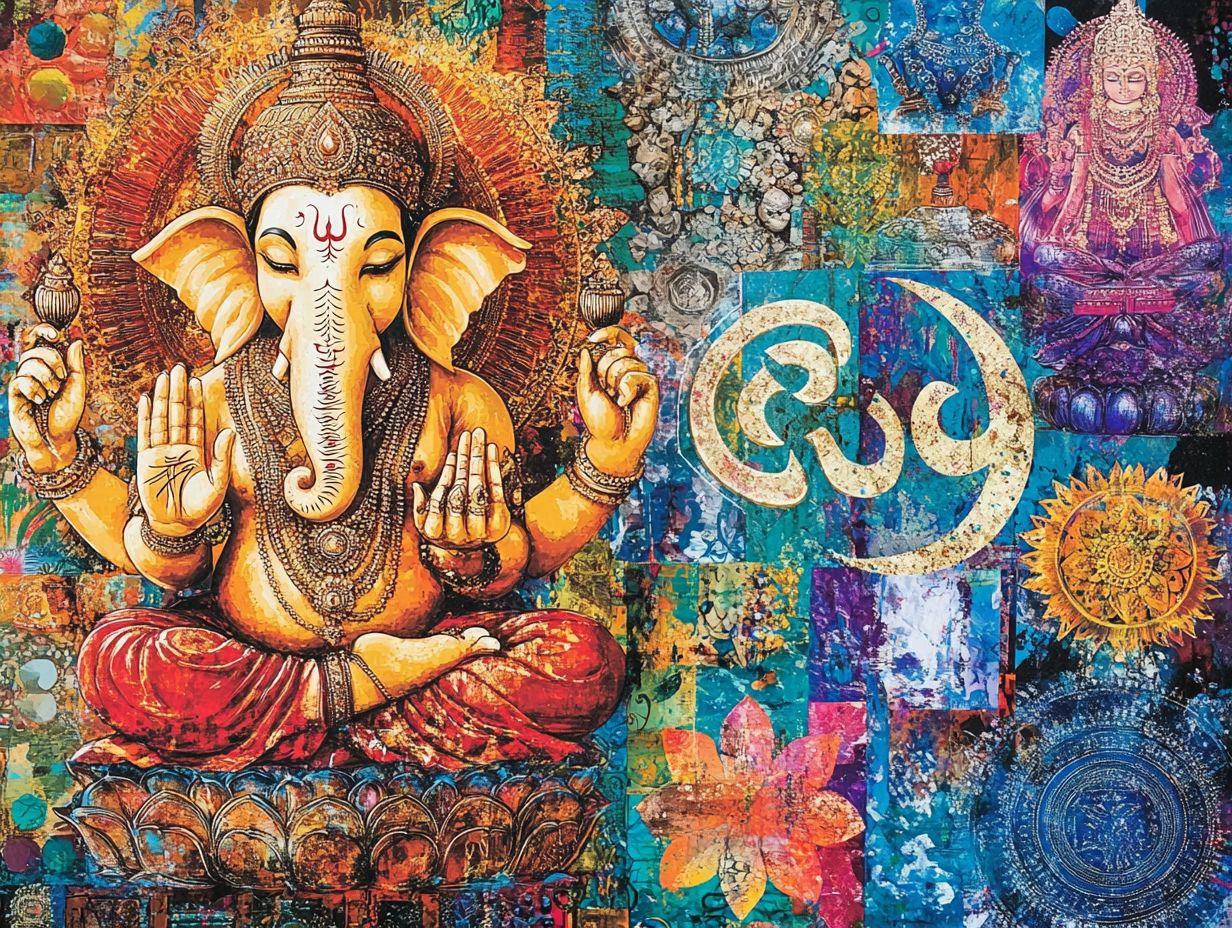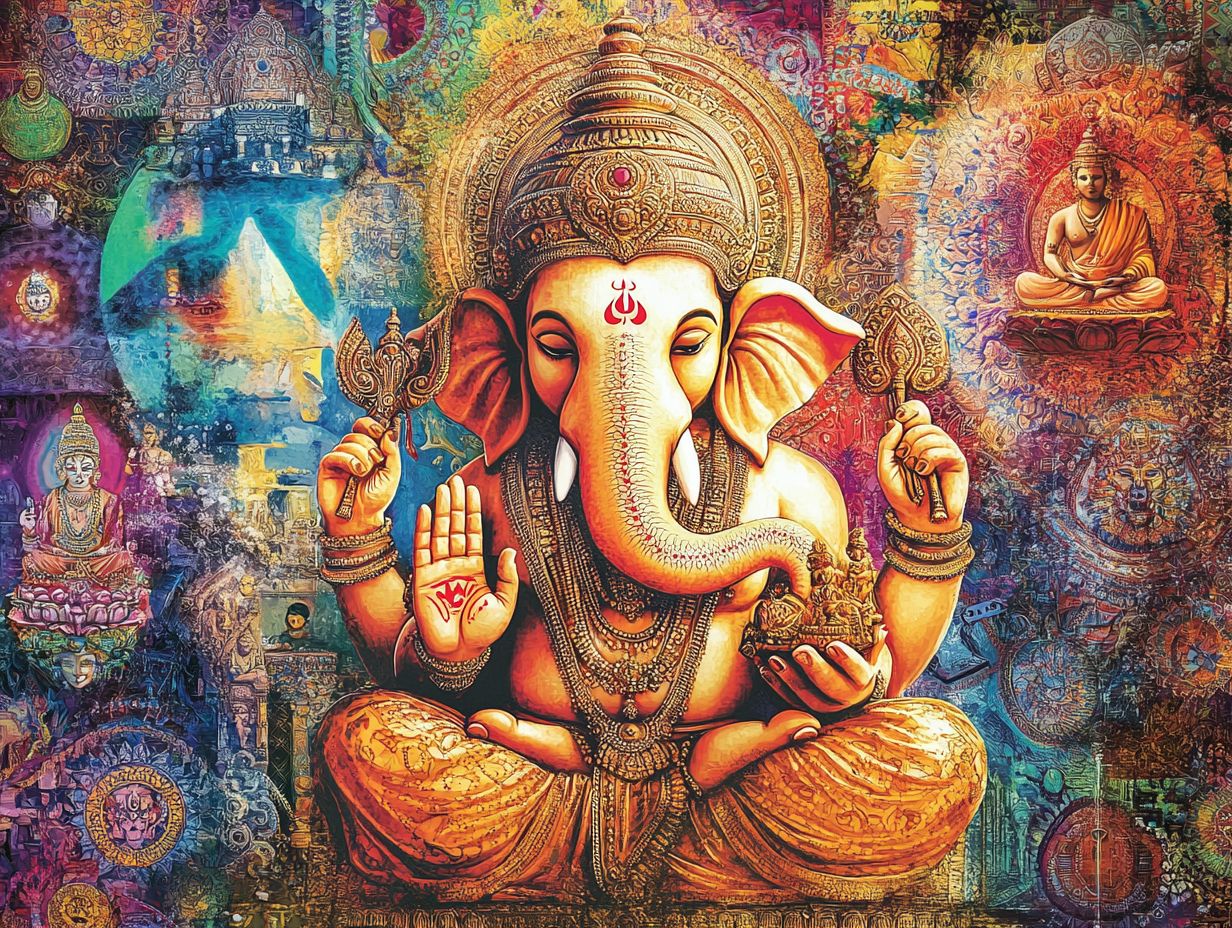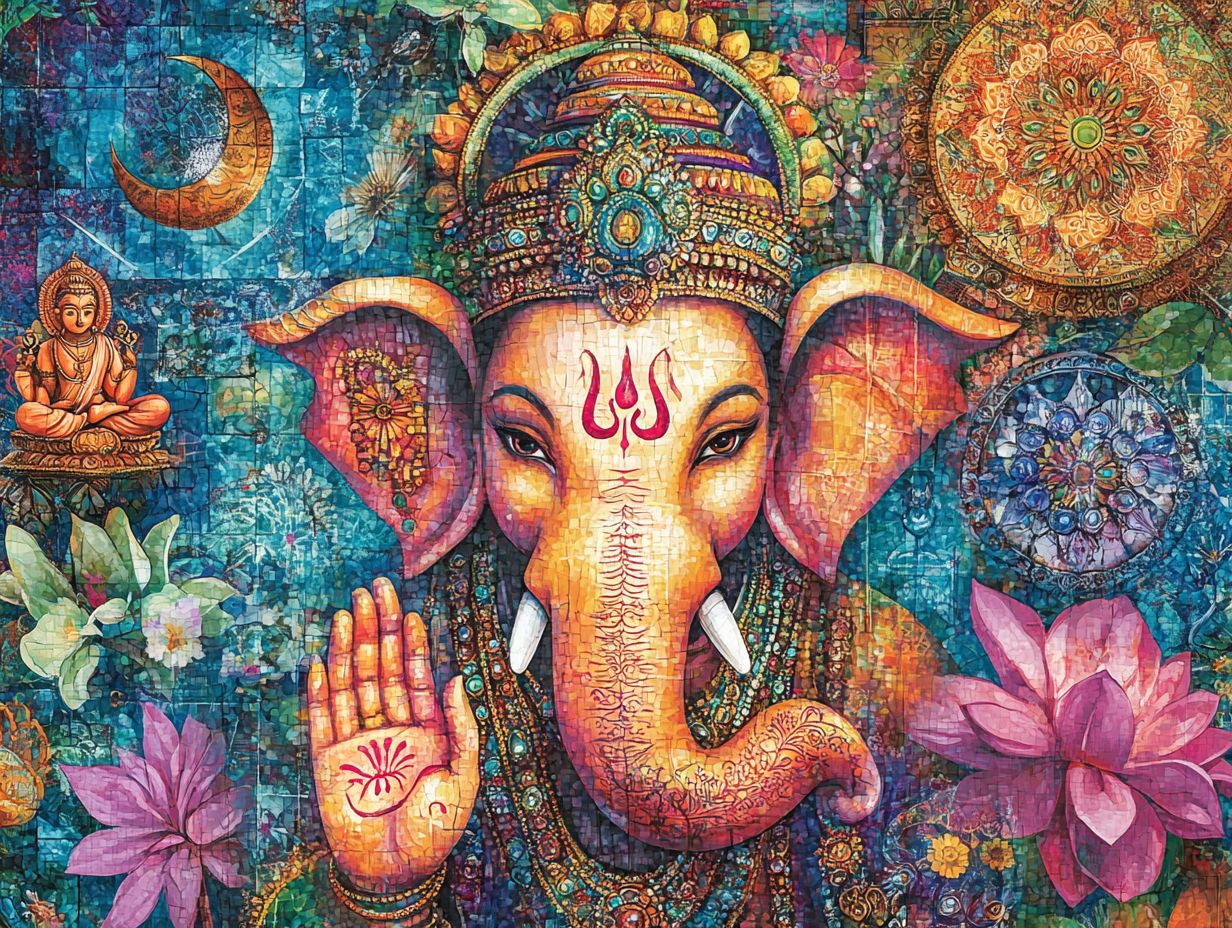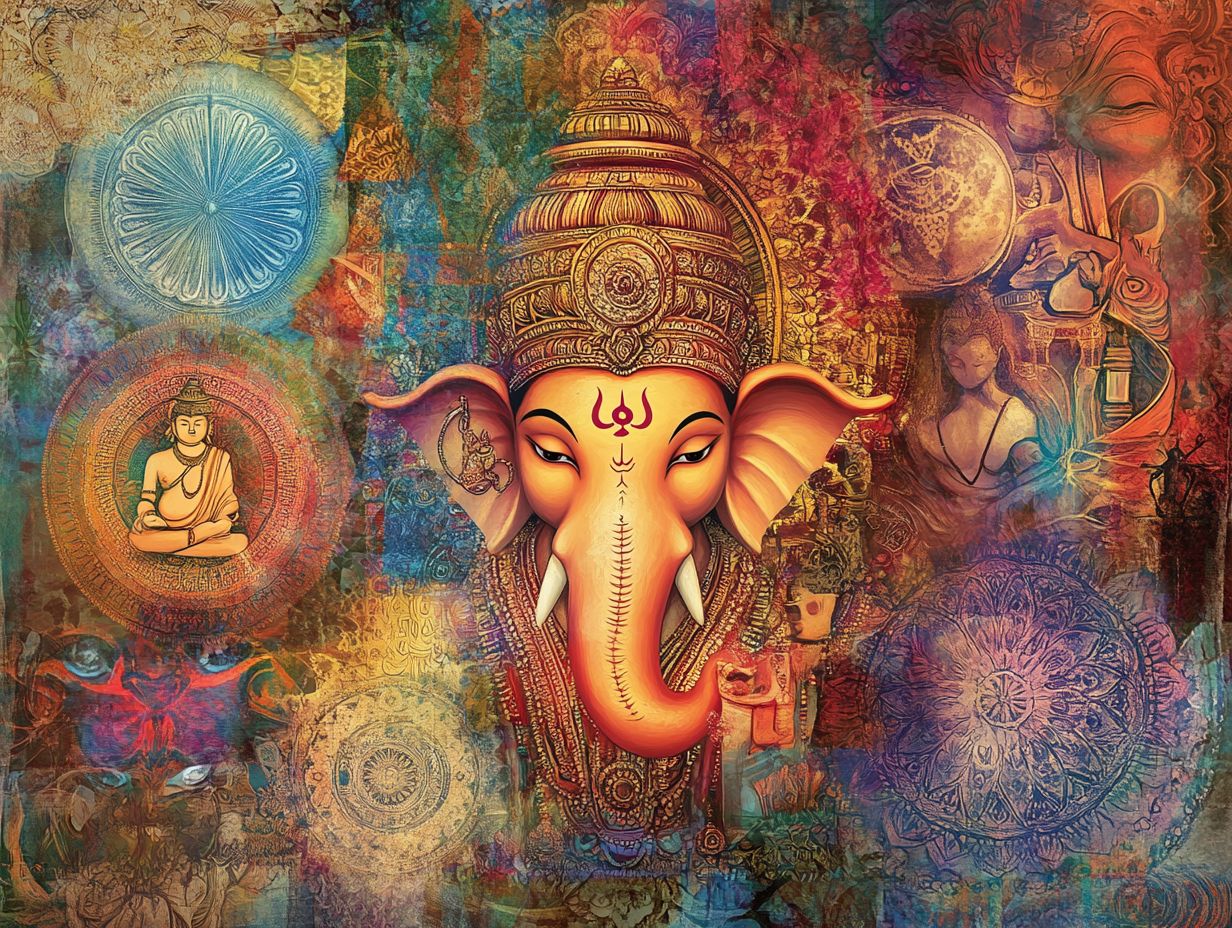Why is Hinduism So Confusing?
Hinduism, regarded as one of the world’s oldest religions, presents a rich tapestry of beliefs, practices, and philosophies that may seem overwhelming to those unacquainted with its intricate layers, often causing confusion.
This article seeks to unravel the core beliefs of Hinduism, diving into fundamental concepts such as Brahman, karma, and dharma, while also examining the significance of reincarnation and moksha.
It addresses the reasons why Hinduism can often appear confusing, from its multitude of deities to its diverse range of practices, rituals, and traditions.
Readers are invited to discover ways to deepen their understanding of this vibrant faith and trace its evolution through the ages. This exploration offers an enlightening journey into the very heart of Hinduism.
What is Hinduism?

Hinduism stands as one of the oldest religions in existence, distinguished by a rich tapestry of beliefs, rituals, and a remarkable diversity that echoes its ancient origins. Its teachings encompass a variety of philosophical schools, including Vedanta, Samkhya, and Nyaya.
It embraces a vast spectrum of philosophies and practices, from the veneration of a multitude of deities to the quest for spiritual enlightenment through diverse avenues such as meditation, yoga, and bhakti.
At the heart of Hinduism lie the sacred texts, notably the Vedas and Upanishads, which offer profound insights into its intricate cosmology, ethical principles, and the essence of reality itself. Additionally, the teachings and practices of various gurus and their interpretations of these scriptures play a significant role in shaping Hindu philosophy.
The interplay between tradition and contemporary interpretations contributes to Hinduism’s distinctive identity, rendering it a dynamic spiritual practice that continuously engages with life’s most profound existential questions.
What are the Core Beliefs of Hinduism?
The core beliefs of Hinduism establish a multifaceted framework that intricately guides the spiritual lives of its adherents, fostering a deep sense of religious tolerance and interfaith dialogue.
These beliefs are profoundly rooted in philosophical concepts such as Brahman, representing the ultimate reality, and the individual soul, known as Atman.
At the heart of these principles lies the doctrine of karma, which asserts that every action yields consequences, coupled with the notion of dharma, which underscores the ethical duties corresponding to one’s role in society. These principles are often reflected in Hinduism’s emphasis on ethics and morality.
Additionally, the belief in reincarnation, or samsara, emphasizes the cyclical nature of existence, while the ultimate aspiration of achieving moksha signifies liberation from this cycle, leading to a state of spiritual enlightenment.
What is the Concept of Brahman?
Brahman, within the realm of Hindu philosophy, is esteemed as the ultimate reality and the wellspring of all existence, transcending the confines of the physical world and encompassing the entirety of the universe. This notion of Brahman unveils the profound nature of divinity, often linked to various deities within the pantheon, each embodying distinct attributes of this singular source. To grasp the essence of Brahman is to invite contemplation of one’s own spiritual identity and relationship with the cosmos.
The Upanishads, for example, present Brahman as the unchanging, eternal reality that underlies all phenomena, encapsulating the very essence of existence. This portrayal invites philosophical exploration into the nature of God and ultimate reality.
In these revered texts, Brahman is described as both the cause and effect of the cosmos, standing in stark contrast to the impermanent nature of life itself. Meanwhile, the Bhagavad Gita offers a more personalized interpretation of Brahman, urging the devotee to perceive divinity in their actions and within their own being.
This multifaceted perspective enables seekers to approach Brahman from diverse angles whether through meditation, devotion, or philosophical exploration emphasizing its importance not only in an academic context but also as a pathway to spiritual liberation and self-realization.
What is the Role of Karma in Hinduism?
Karma, a foundational concept in Hinduism, embodies the law of cause and effect that intricately governs the moral dimensions of human actions. It asserts that every action produces consequences that reverberate beyond the present, influencing not only one s current existence but also future reincarnations within the cyclic journey of samsara. This belief in karma serves as a guiding principle for ethical living, inspiring individuals to align their actions with moral tenets and dharma.
The implications of karma often extend beyond personal conduct, prompting individuals to reflect on societal norms. It challenges them to consider how collective actions shape community well-being and how ethical dilemmas arise when personal desires conflict with broader responsibilities to others.
Anecdotes of altruism frequently illustrate this concept; those who engage in selfless acts often report a profound sense of fulfillment and joy, reinforcing the notion that good deeds return in unexpected ways.
Furthermore, practices such as meditation and self-reflection foster a deeper understanding of one s actions and their repercussions, enabling individuals to make choices that positively influence both personal growth and the greater society. These practices are often done under the guidance of gurus.
These interpretations of karma not only offer a framework for navigating life’s challenges but also highlight its integral role in shaping moral consciousness across diverse cultures.
What is the Importance of Dharma in Hinduism?
Dharma stands as a cornerstone in Hinduism, representing the ethical and moral duties that individuals must uphold in alignment with their societal roles and personal circumstances. It encapsulates the principles of righteousness and justice, serving as a guiding force for practitioners as they navigate decisions that resonate with their spiritual beliefs and contribute to the greater good of the community. The fulfillment of one s dharma is not merely a personal pursuit; it is integral to maintaining harmony within the cosmic order.
However, the concept of dharma extends far beyond its fundamental definition, unfolding into a rich tapestry of interpretations and applications across various sects and regional practices. In some traditions, dharma underscores the importance of family values, fostering respect and love within familial structures. Conversely, other interpretations emphasize community responsibilities and social justice, asserting that one s actions should aim to uplift society as a whole.
The diverse philosophical schools within Hinduism, including Vedanta, Samkhya, Yoga, Nyaya, and Vaisheshika, provide unique perspectives on how individuals interpret their ethical duties based on life stages and personal inclinations, thereby enriching the ongoing discourse surrounding this complex and multifaceted principle.
What is the Significance of Reincarnation in Hinduism?
Reincarnation stands as a fundamental tenet of Hinduism, positing that the soul is caught in an endless cycle of birth, death, and rebirth, a process known as samsara. This profound concept not only underscores the ephemeral nature of existence but also embodies the belief in an afterlife, where the actions taken in previous lives wield significant influence over one s current and future state. The notion of reincarnation serves as a compelling impetus for individuals to live with ethical integrity and pursue spiritual advancement, ultimately aiming for liberation, or moksha.
The ramifications of this belief profoundly shape the daily lives of its adherents, who frequently engage in rituals and practices that resonate with their moral values and responsibilities. For example, individuals often immerse themselves in meditation, yoga, and acts of selfless service, activities believed to cultivate positive karma and facilitate their journey toward a more enlightened existence.
Philosophical interpretations of reincarnation invite a deeper reflection on one s life choices, engendering a sense of moral accountability that transcends generations. This concept also highlights the importance of ethical integrity and environmentalism in shaping a sustainable future.
Narratives of past lives commonly emerge within spiritual communities, enriching the understanding of identity and purpose, and prompting many to perceive each moment as a valuable opportunity for growth and redemption.
Why is Hinduism Considered Confusing?

Hinduism frequently presents itself as a tapestry of complexity, marked by a remarkable diversity of beliefs, practices, and rituals that differ significantly across various regions and sects. This pluralism encompasses a rich array of deities, philosophies, and sacred texts, which can easily lead to misunderstandings for those who are not well-versed in its intricacies.
Moreover, the absence of a singular central text adds another layer of complexity, as practitioners may rely on a multitude of scriptures including the Vedas, Upanishads, and other sacred writings to inform their spiritual practices and shape their worldviews.
Is it Because of the Many Gods and Goddesses?
The multitude of gods and goddesses within Hinduism significantly contributes to its reputation as a complex religion, characterized by a rich pantheon that mirrors various dimensions of life and nature. This richness is further accentuated by the Bhakti movement, which emphasizes devotion and personal connection with the divine.
This polytheistic framework offers a diverse array of divine representations, each embodying distinct attributes and powers, thereby enabling devotees to forge personal connections with the sacred. The worship of these deities is often accompanied by unique rituals and festivals, further enhancing the intricate tapestry of Hindu practices.
This diversity extends beyond mere aesthetics; it cultivates a sense of inclusivity that allows individuals to discover a deity resonating with their personal experiences and aspirations, reflecting the rich philosophy and beliefs of Hinduism. For instance, Lakshmi represents wealth and prosperity, while Shiva embodies destruction and regeneration, offering worshippers the opportunity to seek specific blessings.
Celebrations such as Diwali and Navaratri exemplify this multiplicity, incorporating various deities and fostering communal harmony alongside individual expression, highlighting the significance of festivals and rituals in maintaining cultural traditions.
Such inclusive practices nurture a vibrant spiritual landscape wherein diverse perspectives on the divine coexist, enriching believers’ emotional and cultural connections within the community and showcasing the pluralistic nature of Hinduism.
Is it Because of the Lack of a Central Text?
The absence of a singular central text in Hinduism significantly contributes to its perceived complexity, as adherents draw from a vast array of scriptures, including the Vedas, Upanishads, and various Puranas.
This rich diversity of sacred texts facilitates multiple interpretations and philosophical schools, reflecting the intricate tapestry of beliefs that define Hindu thought. Consequently, followers may embrace different traditions and teachings, resulting in a notable lack of uniformity in practices and beliefs.
This absence of a definitive scripture encourages individuals to personalize their spirituality, allowing them to forge a connection with the divine through an array of rituals, practices, and philosophical perspectives, often integrating bhakti and karma theories.
Each community nurtures its own unique understanding of sacred texts, leading to enriched spiritual experiences that resonate deeply on a personal level.
Such diversity, however, can also give rise to misunderstandings among practitioners, as differing interpretations may clash or be misrepresented in discourse. Ultimately, while this multiplicity enhances the spiritual landscape of Hinduism, it simultaneously presents challenges that necessitate dialogue and respect among its diverse adherents.
Is it Because of the Diversity of Practices and Beliefs?
The immense diversity of practices and beliefs within Hinduism serves as a significant factor contributing to confusion, as various sects and regional traditions emphasize distinct rituals, festivals, and philosophical interpretations.
From the intricate adornment of idols during puja to the celebration of unique festivals, these practices can differ remarkably, reflecting local customs and historical influences. This rich tapestry of diversity enhances the spiritual landscape of Hinduism, yet it also presents challenges for those striving to grasp its core tenets.
For instance, the vibrant festival of Diwali is celebrated with an array of customs across different states, symbolizing the triumph of light over darkness and showcasing cultural practices.
Meanwhile, the colorful Navratri festival showcases regional dances and rituals dedicated to honoring the goddess Durga. Recognizing such diversity is essential, as it enables individuals to appreciate the myriad ways in which devotion is manifested.
By diving into the significance behind these rituals whether it is the unifying aspect of communal celebrations or the personal devotions expressed through daily practices one can achieve a deeper understanding of Hinduism as a dynamic and evolving tradition, rather than a monolithic belief system. This heightened awareness dispels misconceptions and cultivates a more nuanced perspective on this intricate faith.
How Can One Better Understand Hinduism?
Acquiring a profound understanding of Hinduism necessitates a thorough examination of its foundational texts, such as the Vedas and Upanishads, alongside an active engagement with its rituals and community practices.
Through the study of these sacred scriptures, one can uncover the core beliefs, philosophical intricacies, and ethical principles that inform Hindu thought.
Additionally, participating in rituals and conversing with practicing Hindus offers invaluable perspectives on the lived experiences within this multifaceted religion.
Studying the Vedas and Upanishads
Studying the Vedas and Upanishads is essential for anyone aiming to grasp the philosophical and spiritual foundations of Hinduism. These ancient scriptures form the bedrock of its beliefs and practices. The Vedas, rich with hymns and rituals, offer profound insights into early Hindu thought, while the Upanishads explore metaphysical concepts, engaging in a thoughtful discourse on the nature of reality and the self.
These texts illuminate the intricacies of ritual and devotion, while simultaneously inspiring introspection and a thirst for knowledge. They emphasize the interconnectedness of all beings, weaving a rich tapestry of themes such as karma, dharma, and moksha that resonate powerfully in contemporary life. Followers are urged to pursue spiritual growth and enlightenment, even amid the chaos of modern existence.
The teachings encapsulated within the Vedas and Upanishads foster a nuanced understanding of ethics and morality, providing guiding principles for individuals navigating both personal and societal challenges. Their relevance continues to expand in today s world, as many are increasingly drawn to spirituality, seeking answers that transcend materialism.
By diving into these profound works, practitioners can rediscover ancient wisdom that promotes mindfulness and cultivates a deep sense of unity with the universe, addressing existential and moral dilemmas.
Learning from a Guru or Spiritual Teacher

Learning from a guru or spiritual teacher is an essential component of comprehending Hinduism, as these mentors illuminate the intricate teachings, rituals, and philosophies that define the faith. The guru-disciple relationship is not merely an exchange of knowledge; it serves as a catalyst for personal growth and spiritual enlightenment, enabling individuals to traverse the complexities of Hindu beliefs and practices.
Within the rich tapestry of Hindu tradition, the significance of mentorship transcends simple instruction; it embodies the very essence of spiritual nurturing and communal connection.
Esteemed figures such as Sri Ramakrishna and Swami Vivekananda stand as paragons of this ideal, shaping the aspirations of seekers with their profound wisdom and steadfast dedication to service. Their teachings underscore a dual journey: the quest for moksha, or liberation, alongside a collective commitment to the upliftment of society.
Through the narratives of devotion embodied in the lives of these revered gurus, one can appreciate the profound impact of spiritual guidance on both individual journeys and communal harmony, fostering a legacy that continues to illuminate and inspire successive generations, especially through their teachings on karma and bhakti.
Visiting Hindu Temples and Participating in Rituals
Visiting Hindu temples and participating in rituals provide individuals with immersive encounters that reveal the spirituality and communal dynamics woven into the fabric of the religion. These sacred spaces serve as gathering points where adherents unite to engage in puja and various other rituals, fostering a profound sense of belonging and shared spirituality.
Rituals such as aarti, prasad distribution, and homa possess deep meanings that not only connect devotees to the divine but also strengthen communal ties. Attending festive occasions like Diwali or Mahashivaratri transforms an individual s spiritual journey into a collective celebration, enriching their understanding of faith.
Through these activities, participants deepen their connections to the deities while simultaneously gaining opportunities to learn from fellow worshippers, sharing insights and experiences that shape their personal belief systems. As these communal practices unfold, the essence of Hinduism emerges as a vibrant and multifaceted faith, highlighting the crucial role of community in nurturing individual spirituality.
Engaging in Dialogue and Discussion with Practicing Hindus
Engaging in dialogue and discussion with practicing Hindus can significantly enrich one’s understanding of the religion, offering insights into individual beliefs, practices, and the subtle nuances that often elude textual descriptions. Such interactions cultivate an appreciation for the inherent diversity within Hinduism, fostering respect for the myriad interpretations and practices that exist.
Through open conversations, practitioners share their personal narratives, illuminating how their unique experiences shape their beliefs and rituals. These narratives act as a crucial bridge, connecting various perspectives and dispelling misconceptions that frequently stem from a lack of understanding. By diving into these personal histories, individuals can observe the dynamic interplay between culture and spirituality, recognizing that Hinduism is not a monolithic faith but rather a rich tapestry woven from the threads of countless individual experiences.
It becomes evident that collective wisdom arises when diverse voices unite, paving the way for deeper and more empathetic engagement with the religion as a whole.
Engaging in dialogue and discussion with practicing Hindus can significantly enrich one’s understanding of the religion, offering insights into individual beliefs, practices, and the subtle nuances that often elude textual descriptions. Such interactions cultivate an appreciation for the inherent diversity within Hinduism, fostering respect for the myriad interpretations and practices that exist.
Through open conversations, practitioners share their personal narratives, illuminating how their unique experiences shape their beliefs and rituals. These narratives act as a crucial bridge, connecting various perspectives and dispelling misconceptions that frequently stem from a lack of understanding. By diving into these personal histories, individuals can observe the dynamic interplay between culture and spirituality, recognizing that Hinduism is not a monolithic faith but rather a rich tapestry woven from the threads of countless individual experiences.
It becomes evident that collective wisdom arises when diverse voices unite, paving the way for deeper and more empathetic engagement with the religion as a whole.
How Has Hinduism Evolved Over Time?
The evolution of Hinduism throughout history is characterized by profound historical contexts and cultural influences that have molded its beliefs, practices, rituals, and societal roles. From its ancient roots in the Vedic period and the Upanishads to the contemporary interpretations emerging in a globalized world, Hinduism has exhibited an extraordinary capacity for adaptation while steadfastly upholding its core principles, including karma, dharma, and moksha.
This historical progression is evident in the dynamic dialogues among its diverse sects such as Vedanta, Samkhya, and Nyaya, and philosophical schools, as well as the significant effects of colonialism and modernization.
The Influence of Other Religions and Cultures
The influence of other religions and cultures has significantly shaped Hinduism, resulting in a rich tapestry of beliefs and practices marked by syncretism and diversity. Through interactions with Buddhism, Jainism, and other faiths, Hinduism has absorbed elements that have enhanced its traditions, rituals, and philosophical thought.
For example, the integration of Buddhist concepts such as compassion and non-attachment has been pivotal in the development of various Hindu practices and texts, fostering a broader perspective on spirituality. Likewise, the principles of Jainism, particularly the emphasis on non-violence (ahimsa) and asceticism, have subtly influenced the rituals, ethics, and morality within Hinduism.
This blending of ideas is equally evident in the worship of deities, where the fluidity of divine representation allows for a synthesis of diverse practices and beliefs from neighboring cultures. Such transformation is not confined to philosophy; it also permeates festive celebrations, where local customs from tribal communities enrich the vibrant tapestry of Hindu festivals and community rituals. This showcases an ongoing evolution of practices that reflect a dynamic and inclusive spiritual landscape.
The Impact of Colonialism and Modernization
Colonialism and modernization have profoundly influenced Hinduism, challenging established practices and beliefs while simultaneously instigating a cultural re-examination and a resurgence of identity. The encounter with Western philosophies and values prompted many Hindus to reinterpret their spiritual practices, giving rise to new movements and redefining the relevance of ancient traditions and scriptures in contemporary society.
These transformative experiences not only reshaped individual beliefs but also significantly impacted communal dynamics within Hindu communities. As globalization progressed, the fusion of traditional rituals with modern lifestyles produced a unique spiritual expression that honors both historical roots and contemporary needs. This evolving landscape witnessed the emergence of new interpretations of scriptures and practices, fostering greater inclusivity and adaptability, including the resurgence of the Bhakti movement and new forms of yoga and meditation.
The synthesis of indigenous customs with foreign ideologies cultivated a diverse spectrum of beliefs that resonated with younger generations, ensuring that spirituality remains an essential aspect of their identities, even in the midst of rapidly changing socio-economic contexts and contemporary issues.
The Growth of Hinduism in the Western World

The growth of Hinduism in the Western world has garnered significant attention in recent decades, primarily driven by globalization and an increasing fascination with spirituality and alternative practices such as yoga and meditation. This expansion has fostered greater visibility and dialogue surrounding Hindu beliefs, thereby promoting interfaith understanding and appreciation of its rich and diverse traditions. Additionally, the rise of spiritual retreats and online platforms has facilitated the spread of Hindu teachings and practices.
As individuals increasingly gravitate toward holistic lifestyles and mental well-being, they find themselves inspired by the core philosophies of Hinduism, which emphasize mindfulness, self-realization, and community. The incorporation of yoga into Western fitness culture acts as a bridge, connecting Eastern spiritual practices with Western lifestyles. This cross-cultural exchange enhances both personal and communal spirituality.
Moreover, the emergence of cultural festivals, spiritual retreats, and online platforms facilitates a profound exploration of Hindu texts and rituals. This not only encourages enriching dialogues within Hindu communities but also extends to the broader society. Such cultural interchange enhances the spiritual landscape of the West while fostering mutual respect among diverse faiths. This process is further enriched by interfaith dialogue and the integration of Hindu ethical and moral principles into broader societal norms.
Frequently Asked Questions
Why is Hinduism So Confusing?
Hinduism is a complex and diverse religion that has evolved over thousands of years, which can make it confusing for those unfamiliar with its beliefs and practices, including its various deities, rituals, and philosophical schools.
Hinduism is a complex and diverse religion that has evolved over thousands of years, which can make it confusing for those unfamiliar with its beliefs and practices.
What are the main reasons for the confusion surrounding Hinduism?
One of the main reasons for the confusion is that Hinduism does not have a single founder or central authority, resulting in a wide range of interpretations and practices. Also, the vast array of scriptures, including the Vedas, Upanishads, and epics like the Ramayana and Mahabharata, contribute to its complexity.
How many gods do Hindus worship?
Hinduism has a polytheistic belief system, meaning there are many gods and goddesses worshipped. The exact number is not known, but it is estimated to be around 330 million. Each deity symbolizes different aspects of the ultimate reality, Brahman.
Are there any common beliefs or teachings in Hinduism?
Although there is no one set of beliefs in Hinduism, there are some core principles that are shared amongst most Hindus, such as the belief in reincarnation, karma, dharma, and moksha. The philosophical debates between dualism and non-dualism also play a key role in shaping Hindu thought.
Why are there so many different Hindu deities?
Hinduism views the different deities as different manifestations of the ultimate reality, Brahman. Each deity represents a different aspect of this ultimate reality, giving devotees a variety of ways to connect with the divine. This pluralism is a reflection of the religion’s syncretism and philosophical diversity.
Is it possible to fully understand Hinduism?
Due to the complexities and diversity within Hinduism, it is difficult for anyone, even Hindus themselves, to have a complete understanding of the religion. However, this does not diminish the spiritual and cultural significance of Hinduism for its followers. The teachings and narratives within Hinduism continue to offer profound insights into spirituality and the nature of existence.
